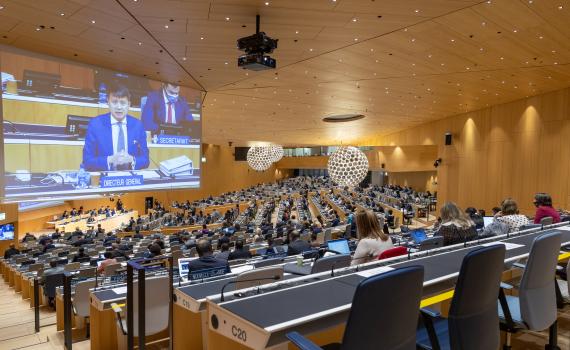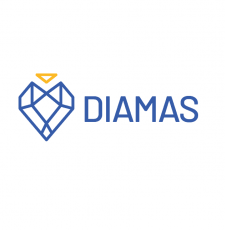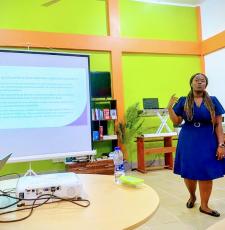
Teresa Hackett, EIFL Copyright and Libraries Programme Manager, reports on the annual WIPO Assemblies (4-8 October 2021), where she delivered online statements on behalf of EIFL on two key topics for libraries: copyright limitations and exceptions, and the Marrakesh Treaty for persons with print disabilities.
As in 2020, the Assemblies were shortened to five days due to COVID-19 restrictions. Unlike last year, a limited number of delegates from member states were allowed to attend in person (some had travelled to Geneva from their capitals), while observers (such as EIFL) joined remotely. Nevertheless, the circumstances of participation meant it remained largely a low key affair with reports and decisions mostly pre-agreed by delegates in advance of the Assemblies.
Setting out WIPO’s future direction
Two key documents, that will guide WIPO’s work over the coming years, were among those that got an official stamp of approval - the Program of Work and Budget 2022/23 and the Medium Term Strategic Plan 2022-2026. The Program of Work and Budget includes a commitment to accelerate work on COVID with specific activities on health and IP issues, including flexibilities in the WTO-administered Agreement on Trade-Related Aspects of Intellectual Property Rights (TRIPS), and to explain the potential for IP to contribute towards vaccine equity, and the needs of everyone, everywhere. The Medium Term Strategic Plan sets out, among other issues, WIPO’s intention to play a more active role within the UN family of agencies to address global challenges encapsulated in the Sustainable Development Goals (SDGs).
EIFL looks forward to learning how the plans, that provide direction across all WIPO’s strategic pillars and work areas, are put into practice over the coming years.
Support for copyright L&Es
Strong support for continued work on copyright limitations and exceptions (L&Es) came from many delegations in most regional groups in the agenda item discussing the report of the Standing Committee on Copyright and Related Rights (SCCR). There was a particular interest in finding consensus on IP-related solutions to the pandemic, and delegates looked forward to learning about the challenges of COVID on copyright, education and the creative ecosystems at the information session scheduled for SCCR/42 in 2022.
In its statement, EIFL highlighted how the COVID pandemic has shown the need for clear copyright rules to support online education, research and digital access to library collections. To address these issues, SCCR should accelerate its work in three priority areas: online learning, text and data mining, and digital preservation. EIFL also welcomed the more active role that WIPO will plan in fostering the SDGs. Work on L&Es will help implement key SDGs on education, innovation, and protecting the world’s cultural heritage.
All delegations hoped for the resumption in 2022 of ordinary sessions of SCCR to work together on these issues, and to making decisions on substantive issues.
Marrakesh - a great success for WIPO, multilateralism and people with print disabilities
EIFL participated in the meeting of the Marrakesh Assembly that takes stock of the status of the Marrakesh Treaty for persons with print disabilities including ratifications and accessions (81 Contracting Parties that cover 107 Member States). Since July 2020, the WIPO Secretariat has organized or participated in 22 virtual meetings and webinars involving promotion of the Marrakesh Treaty at the international, regional, and national levels, as well as other activities such as the provision of legislative assistance.
EIFL encouraged governments to consult their local library community when the treaty is being domesticated, giving the example of Zimbabwe where university libraries are getting ready to provide expanded access for blind and visually impaired students, dedicating staff to serving VIPs, and have received training in accessible book production via the WIPO ABC Accessible Publishing initiative.
The Marrakesh Treaty has been a great success for WIPO, multilateralism and people with print disabilities.
Wikimedia Foundation blocked for the second year
The only moment of controversy came when China blocked the application of the Wikimedia Foundation for WIPO observer status for the second year in a row.
In response, EIFL joined a letter from civil society calling on delegations to do everything in their power to facilitate admission of the Wikimedia Foundation at the next WIPO Assemblies in 2022. The Wikimedia Foundation is an active and respected stakeholder in the areas of access to knowledge and information, as well as copyright policy, and its projects have a global outreach. Given the key role of WIPO in shaping normative and practical work around copyright that impacts how researchers, educators and the public at large access and use knowledge, not admitting the Wikimedia Foundation as an observer is unacceptable.
Read EIFL’s statements at the WIPO 2021 Assemblies.
SHARE / PRINT








